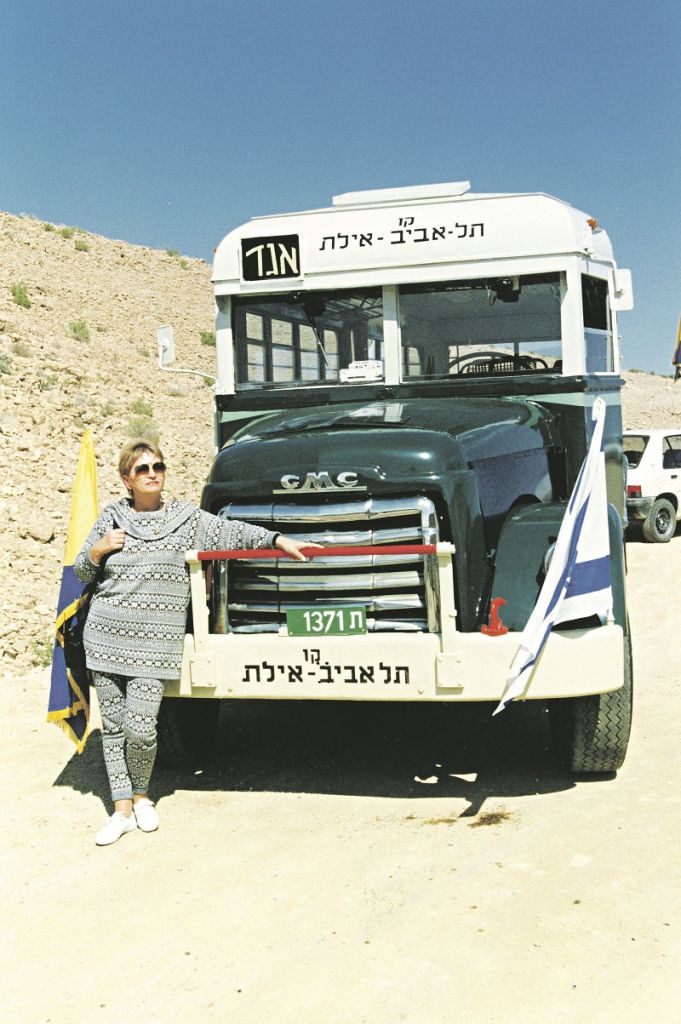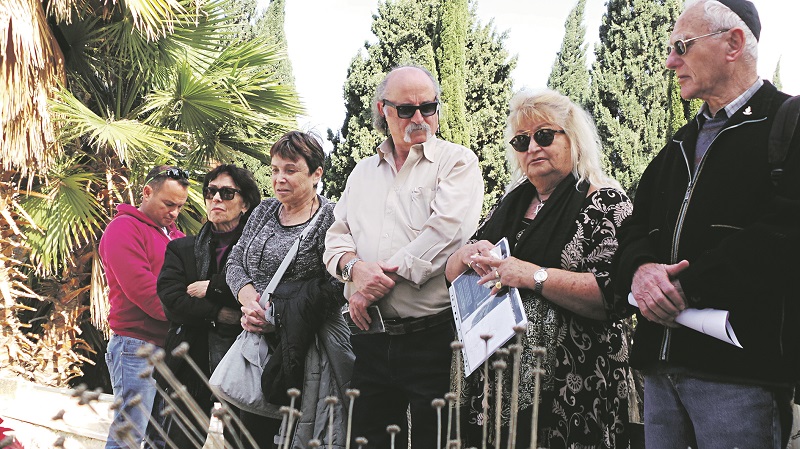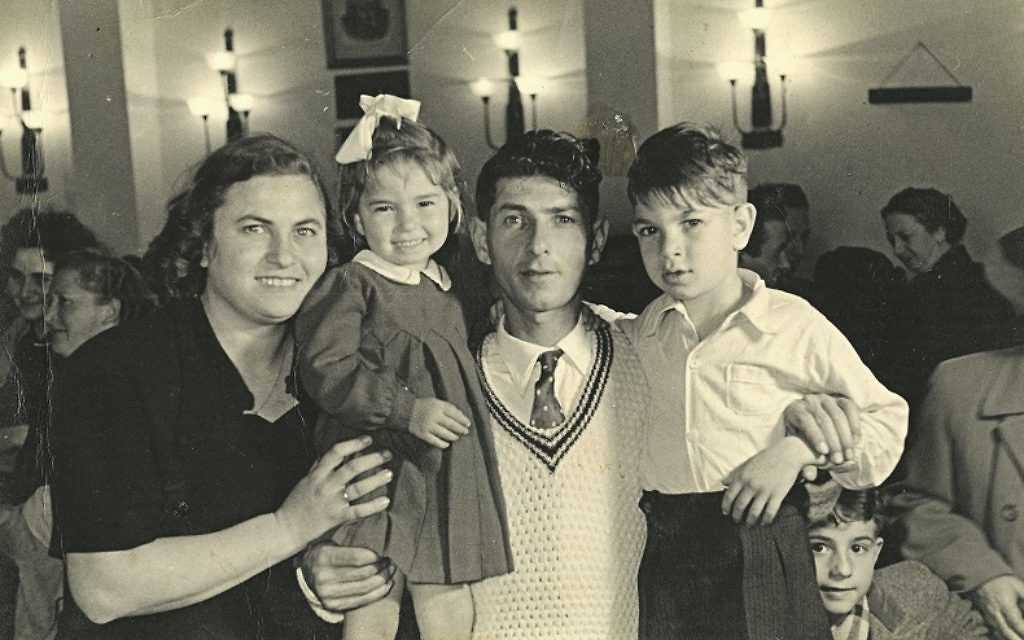The girl who survived the massacre at Scorpion’s Pass
Lisa Sanders speaks to Miri Furstenberg, who was just five-years-old when she watched terrorists brutally murder her family
When Miri Furstenberg was five, she was one of the new-born state of Israel’s elite. It was Purim 1954, and her father, Ephraim, had landed a coveted
job as a bus driver for Egged.
“In those days, Egged drivers earned the highest wages of anybody in the country,” she tells me, while driving us along the coast towards Tel Aviv. “And they didn’t have to pay taxes.”
Sixty-four years ago this month, according to the Hebrew date, Miri, her parents and her brother Haim’ke, nine, were on their way back from a celebratory trip to Eilat.
Get The Jewish News Daily Edition by email and never miss our top stories Free Sign Up
They and other Egged families had been to visit the resort, then celebrating its fifth birthday. Miri recalls the atmosphere of giddy celebration on the bus, as it chugged its way back through the desert.
They drove through the Zin Valley, then bursting with spring flowers. She was wearing her best clothes as she played in the aisle, chatting to other passengers and handing out sweets.
But as they passed Ma’ale Akrabim – Scorpions Pass – this tranquillity was abruptly shattered. “The explosions weren’t so loud in the beginning. It sounded like a Purim carnival or fireworks…”
Gunmen ambushed the bus and opened fire, executing the two drivers and shooting indiscriminately at the passengers.
Miri tried to call out, but was thrown onto the bus floor by an IDF soldier beside her, who shielded her completely with his body. “Shut up! Be quiet or they’ll kill you too,” he urged her.
A moment later, she felt his body’s full weight pressed upon her: he, too, had been shot dead.
From the floor of the bus, Miri watched the terrorists walk between the bodies. “Men dressed in long black robes, their heads covered, weapons drawn, moving from one passenger to the next, shooting them point blank, shaking them to make sure they’re dead.”
At that point, her brother, Haim’ke, called out to her: “Mira’le, where are you? Are they gone?”
Miri stared, helpless, as the terrorists followed the sound of Haim’ke’s voice, lifted up the dead body resting on him, and shot a round into her brother’s head.

Miri, orphaned and alone, was one of only four people to survive the attack. Haim’ke, paralysed and severely brain damaged, was hospitalised for 32 years before he, too, succumbed to his injuries, making him the 11th victim to be killed.
Her mother, Hannah, had been raped and murdered outside the bus, on the desert sand. The perpetrators, thought to be from Jordan, have never been caught.
Miri parks at the gates of the old military cemetery in Tel Aviv, where an annual memorial ceremony is held for the victims of the Scorpions Pass terror attack. She unpacks a large wooden pole that has an Israeli flag attached to it.
The cemetery is an oasis of green and calm amid Tel Aviv’s highways and skyscrapers. We walk past graves of those who fought in the Lehi before 1948. When we reach the graves of Hannah and Ephraim, Miri’s parents, we press the flag into the earth.
Among the dozen or so attendees, I meet Yisrael, Miri’s classmate and fellow children’s house resident from Kibbutz Yakum, where Miri had been sent to live by her grandparents.
The kibbutzniks became her surrogate family. Overall, she has fond memories of growing up in the children’s house, in the austere years of the 1950s and 1960s.
After all, no one else had parents living with them.
Yet she alone had no birthday celebrations, no beaming family to applaud her at school concerts.
Miri carried out her military service during the Six Day War. The self-reliance she’d learned in the kibbutz prepared her well for the chaos of wartime.
Afterwards, she returned to the kibbutz and rushed into an unsuitable marriage. By her 20s, she was divorced, struggling with debts, and bringing up two children alone.
Miri’s daughter, Eilat, and son, Guy, arrive at the cemetery, and the memorial service begins. The chazzan from Egged, which has organised the memorial since 1955, recites the psalms, and the Kaddish.
Social worker and family therapist Pini Rosenberg has worked for Egged since 1978 and got to know Miri in 1997. Aged 48, she had been a widow for four years, after Moshe, her beloved second husband, died suddenly.

“I said, ‘Come on, let’s work together,’” Pini recalls. “So she started to describe all the terrible things that had happened. I told her, ‘Maybe you took to heart too much that cry of the soldier telling you to be quiet.’”
Having blocked out her traumatic memories for so many years, Miri began writing them down. Her autobiography see-saws between tragedy and triumphs, and includes a comic account of a life well-lived – from run-ins with gangsters to sailing a yacht across the Atlantic.
Miri longed to revisit the flat where she had lived with her parents as a young child. Pini accompanied her there.
“I’ve got goosebumps thinking about it,” he says. “She saw all the rooms. She could hear the voices of herself and her brother playing.”
Afterwards, Miri says, she and Pini went to sit on the stairs. “Just like how I used to wait for my dad to come home from his trips driving the bus.”
After the psalms, and the Kaddish, Miri reads her speech. “Sixty-four years have passed since that awful day when you were taken from us,” she begins. She gives a brief update about each of her grandchildren, the great-grandchildren her parents will never know.
One grandson has just passed his driving test. “First time, too. Maybe he gets those driving genes from you,” she finishes.
Pini and the rest of the assembled crowd smile. We pick up the flag and file away from the graves, into the sunshine.
The Girl from Scorpions Pass, by Miri Furstenberg, is available in paperback from Amazon (£6.81) and Kindle (£2.82)

Thank you for helping to make Jewish News the leading source of news and opinion for the UK Jewish community. Today we're asking for your invaluable help to continue putting our community first in everything we do.
For as little as £5 a month you can help sustain the vital work we do in celebrating and standing up for Jewish life in Britain.
Jewish News holds our community together and keeps us connected. Like a synagogue, it’s where people turn to feel part of something bigger. It also proudly shows the rest of Britain the vibrancy and rich culture of modern Jewish life.
You can make a quick and easy one-off or monthly contribution of £5, £10, £20 or any other sum you’re comfortable with.
100% of your donation will help us continue celebrating our community, in all its dynamic diversity...
Engaging
Being a community platform means so much more than producing a newspaper and website. One of our proudest roles is media partnering with our invaluable charities to amplify the outstanding work they do to help us all.
Celebrating
There’s no shortage of oys in the world but Jewish News takes every opportunity to celebrate the joys too, through projects like Night of Heroes, 40 Under 40 and other compelling countdowns that make the community kvell with pride.
Pioneering
In the first collaboration between media outlets from different faiths, Jewish News worked with British Muslim TV and Church Times to produce a list of young activists leading the way on interfaith understanding.
Campaigning
Royal Mail issued a stamp honouring Holocaust hero Sir Nicholas Winton after a Jewish News campaign attracted more than 100,000 backers. Jewish Newsalso produces special editions of the paper highlighting pressing issues including mental health and Holocaust remembrance.
Easy access
In an age when news is readily accessible, Jewish News provides high-quality content free online and offline, removing any financial barriers to connecting people.
Voice of our community to wider society
The Jewish News team regularly appears on TV, radio and on the pages of the national press to comment on stories about the Jewish community. Easy access to the paper on the streets of London also means Jewish News provides an invaluable window into the community for the country at large.
We hope you agree all this is worth preserving.
-
By Laurent Vaughan - Senior Associate (Bishop & Sewell Solicitors)
-
By Laurent Vaughan - Senior Associate (Bishop & Sewell Solicitors)
-
By Laurent Vaughan - Senior Associate (Bishop & Sewell Solicitors)
-
By Laurent Vaughan - Senior Associate (Bishop & Sewell Solicitors)






















